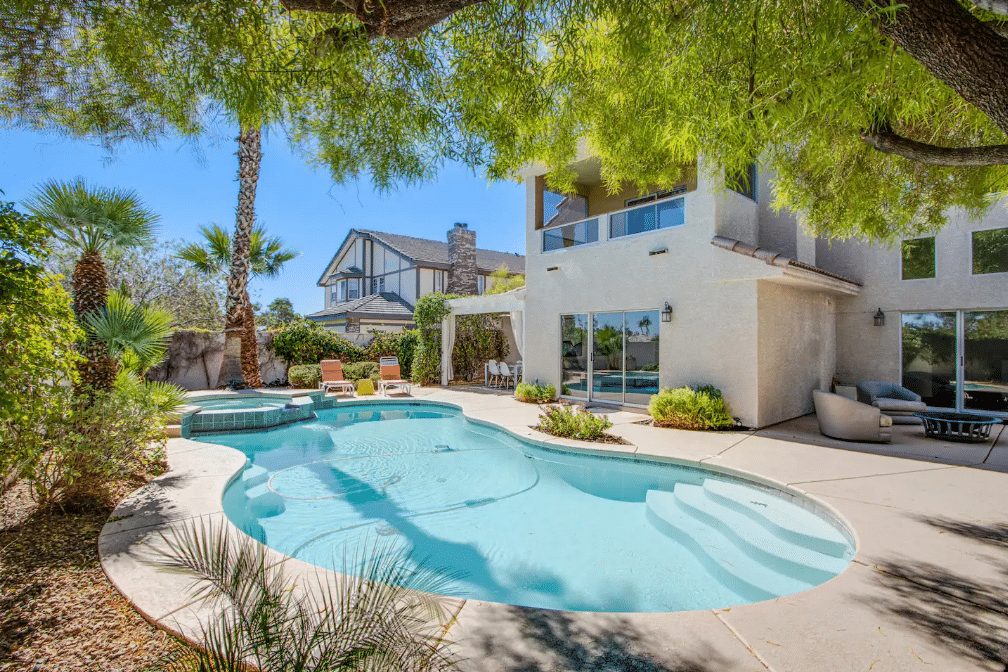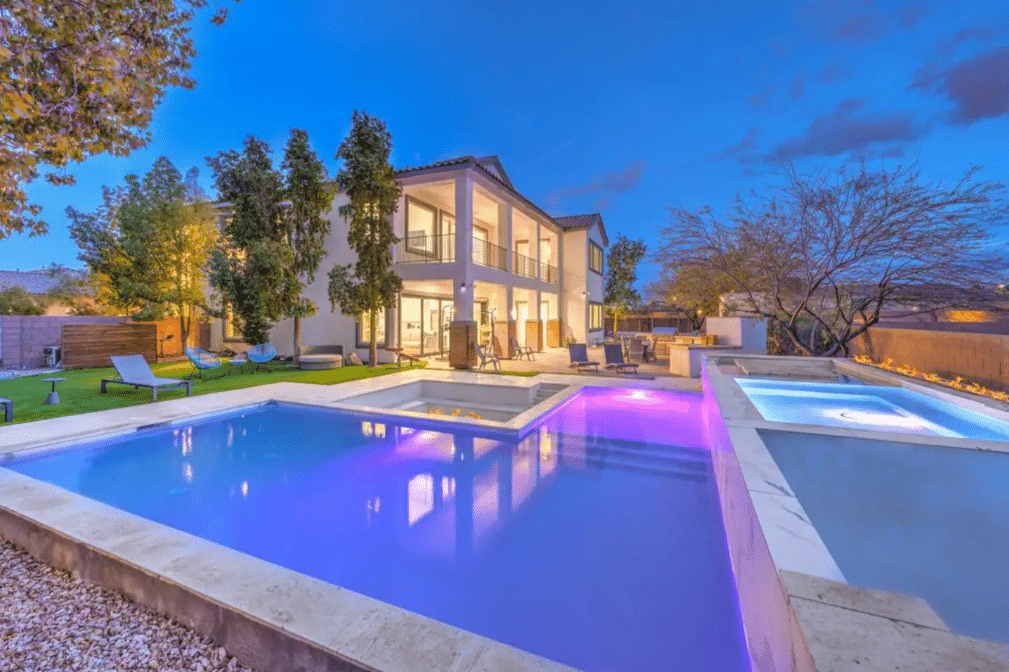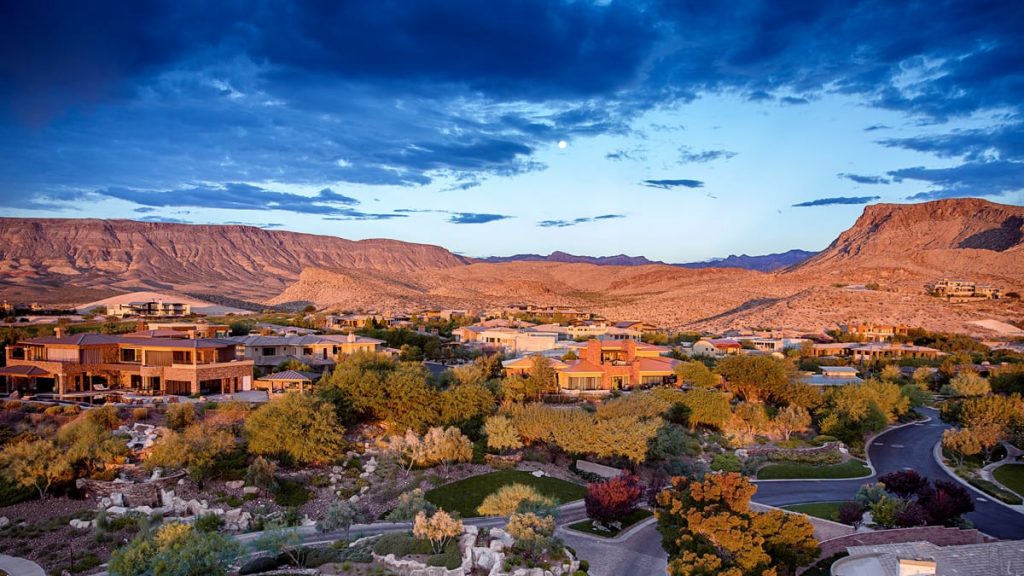Las Vegas Airbnb’s vs. Strip Resorts – Finding Your Perfect Stay



Las Vegas, often hailed as the entertainment capital of the world, is a city that dazzles with its vibrant nightlife, world-class shows, and the iconic Las Vegas Strip. When it comes to accommodations, the city offers an array of options, from luxurious Strip resorts to cozy Airbnb (short-term) rentals. Deciding between the two involves considering the pros and cons, and additional tradeoffs with each offering a unique experience that caters to different preferences.

Convenience and Access: Strip resorts place you right in the heart of the action. You’ll have easy access to renowned casinos, extravagant shows, and a plethora of dining options—all within walking distance.
Luxury and Amenities: Expect lavish accommodations with top-notch facilities, including pools, spas, and world-class restaurants. The opulent décor and ambiance create an immersive and indulgent experience.
Entertainment at Your Fingertips: Many Strip resorts boast their own entertainment venues, clubs, and theaters, offering an array of shows and performances.

Price Tag: Luxury comes with a cost. Strip resorts often have higher price points compared to short-term rentals, especially during peak seasons or for premium rooms. However, during select times of the year with slow general visitation levels, such as dates between Thanksgiving and Christmas, this can also work in the reverse and transform into a Pro!
Crowds and Noise: The bustling atmosphere on the Strip can be invigorating for some but overwhelming for others. Expect crowds, noise, and even more germs, especially during weekends and holidays.

Personalized Experience: Short-term rentals offer a more intimate and personalized stay. You can choose from a variety of accommodations, from high-rise condominiums facing the Strip to spacious houses, providing a more homely feel with more privacy than a hotel with thousands of rooms.
Cost-Effectiveness: In general, short-term rentals can be more budget-friendly than Strip resorts, especially if you’re traveling in a group and can split the cost.
Household Comforts: Although certain condo-hotels along the Strip provide modest kitchenettes, the convenience and ease of access to a complete kitchen within your rental home is worth considering for some travelers. Having a full-kitchen is especially advantageous for travelers who relish cooking, prefer budget-friendly approaches by shopping locally, or have specific dietary needs and seek to sidestep the costly dining offerings along the Strip, even just for part of a stay.
Local Living: Staying in a short-term rental allows you to explore the local neighborhoods, discovering hidden gems, local eateries, and experiencing the city from a different perspective. You can also usually expect to have a human-free check-in to the property with instructions and typically a digital lock or lockbox code being provided for access on your day of arrival.

Distance from the Strip: Most short-term rentals are not directly on the Strip, which means you might need transportation or a longer walk to reach the main attractions. In instances where transportation is needed and you decide to drive your own car, you can also anticipate paying for hourly paid parking at most resorts on the Strip.
Limited Amenities: While many short-term rental properties offer essential amenities, they might not provide the extravagant facilities and services found in Strip resorts, such as on-site entertainment, fitness centers, a spa, shopping, restaurants or 24/7 concierge service. This can sometimes be offset by truly unique, one-of-a-kind amenities at higher end rentals, like basketball courts, bowling lanes, and private heated pools.
Unbranded Experience: While booking through a website such as Airbnb or VRBO may feel as though you are in for a consistent, branded experience at your short-term rental, uniqueness and unpredictability related to individual hosts present a tapestry of experiences to be had from one home to another. You’re likely to have more certainty of what you will and won’t have with a recognizable branded resort on the Strip.

Verification and Reviews: Ensure the property has positive reviews and verifications from previous guests. Look for hosts with a good track record to avoid any potential issues upon arrival. Only book a stay on a trusted platform such as Airbnb or VRBO, and if other websites offer an accommodation that seems too good to be true, it’s best to avoid the risk of ruining your trip to save a few bucks!
Location: Some short-term rental listings might claim to be close to the Strip but could be farther away than expected. Check the exact location on a map and consider transportation options if it’s not within walking distance. If the exact location isn’t disclosed on the listing, message the host to ask for more details about the neighborhood and access to the Strip.

Hidden Costs: Watch out for additional fees not included in the initial price, such as cleaning fees, service charges, pool heating, or security deposits. Read the fine print and ask the host about any extra costs before booking.
Host Communication: Communication with the host is crucial. Make sure they are responsive and available to address any concerns or emergencies during your stay.

Resort Fees: Many Strip resorts charge mandatory daily resort fees that might not be included in the advertised room rate. These fees cover amenities like Wi-Fi, gym access, and pool usage. Confirm the total cost including these fees before booking.
Upgrades and Add-Ons: Resorts often entice guests with upgrades, special packages, or additional services. Be mindful of overspending on extras that might not align with your budget.
Fine Print on Cancellation Policies: Understand the resort’s cancellation policy thoroughly before making a reservation. Some bookings might be non-refundable or have strict cancellation terms.

Choosing between a short-term rentals and a Strip resort ultimately boils down to personal preferences and priorities. If you prioritize convenience, luxury, and being at the epicenter of the Vegas experience, a Strip resort might be the ideal choice. However, if you seek a more intimate, local, and potentially cost-effective stay, a short-term rental can offer a unique and personalized experience.
In both cases, being informed and attentive to the details can make a significant difference in your Las Vegas experience. Whether it’s a short-term rental or a Strip resort, being aware of the potential pitfalls with both options can help you make an informed decision and ensure a smoother and more enjoyable stay in this vibrant city.
Moreover, a blend of both experiences could be the sweet spot. Consider staying a few nights in a lavish Strip resort to soak in the glamor and excitement, then switch to a short-term rental for a taste of local life and a more relaxed atmosphere.
Las Vegas, with its dynamic energy and diverse offerings, ensures that regardless of where you stay, you’ll be immersed in a world of entertainment and excitement. Whether it’s the glitz of the Strip resorts or the charm of a cozy Airbnb, the city promises an unforgettable experience that caters to every traveler’s desires.

Navigating the landscape of short-term rental properties in Las Vegas involves a nuanced understanding of regulations and legal complexities. Acquiring a successful rental property demands thorough research into zoning laws, homeowners’ association regulations, and specific city ordinances governing short-term rentals.
Beyond the initial purchase, ownership requires compliance with licensing requirements, tax obligations, and safety standards set by local authorities. Operating a lucrative short-term rental involves maintaining a delicate balance between market demand, pricing strategies, and stringent adherence to ever-evolving regulations.
While the use-case of an owner who wants to occupy the home at different times of the year may change the personal considerations, operating and maintaining a home in conjunction with a group of local vendors can prove to be extremely challenging for the inexperienced.
To learn more about purchasing a home in Las Vegas, some of the unique characteristics of neighborhoods and communities around town, and even more detail on the considerations for purchasing a short-term rental property in the city, take a look at this article.

|

|

